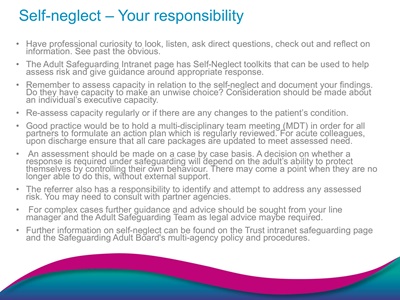
Self-neglect - Your responsibility
• Have professional curiosity to look, listen, ask direct questions, check out and reflect on
information. See past the obvious.
• The Adult Safeguarding Intranet page has Self-Neglect toolkits that can be used to help
assess risk and give guidance around appropriate response.
• Remember to assess capacity in relation to the self-neglect and document your findings.
Do they have capacity to make an unwise choice? Consideration should be made about
an individual's executive capacity.
• Re-assess capacity regularly or if there are any changes to the patient's condition.
• Good practice would be to hold a multi-disciplinary team meeting (MDT) in order for all
partners to formulate an action plan which is regularly reviewed. For acute colleagues,
upon discharge ensure that all care packages are updated to meet assessed need.
• An assessment should be made on a case by case basis. A decision on whether a
response is required under safeguarding will depend on the adult's ability to protect
themselves by controlling their own behaviour. There may come a point when they are no
longer able to do this, without external support.
• The referrer also has a responsibility to identify and attempt to address any assessed
risk. You may need to consult with partner agencies.
• For complex cases further guidance and advice should be sought from your line
manager and the Adult Safeguarding Team as legal advice maybe required.
• Further information on self-neglect can be found on the Trust intranet safeguarding page
and the Safeguarding Adult Board's multi-agency policy and procedures.